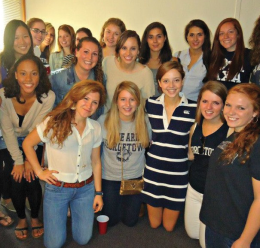
KAPPA KAPPA HOYAS While Georgetown doesn’t officially recognize Greek organizations, groups like Adelfi have still attracted a growing number of students.
Many prospective students visiting Georgetown have entertained the thought of attending a school with active Greek life — serving the community with sorority sisters and squatting for photos, or revelling in the testosterone-filled bonds of brotherhood and sporting lax pinnies with fraternity letters. Yet this image is squelched upon learning that Georgetown lacks any recognized Greek organizations.
As a Jesuit Catholic institution, Georgetown maintains that clubs and activities must be consistent with the university ethos and moral vision. Among other criteria, organizations are only eligible if they allow anyone to join — unless they have obtained special permission — and are not affiliated with a national or local social fraternity or sorority, as stated in the Access to Benefits policy. According to Student Activities Commission Chair Jennifer Chiang (SFS ’15), no fraternities or sororities are currently included within SAC.
The notable exception to this policy is Alpha Phi Omega, the co-ed community service fraternity which has been a recognized student group since 1956 and counts Bill Clinton (SFS ’68) among its notable alumni. According to APO member Pat McCusker (COL ’14), the group is recognized as a CSJ student organization for its role as a service group.
“Being in APO has been really good for me because I am really interested in doing service … and it does a really good job of connecting me with other people who are interested in the same things.”
Georgetown is publicly touted as a non-Greek institution; however, the past few decades have witnessed the growth of a complex network of fraternities and sororities on campus that don’t officially belong. These groups include a myriad of non-official, nationally affiliated service, social, pre-professional, single-sex and coed brother- and sisterhoods.
“I think we’re home to a Greek community, but it’s far from being a deciding factor in most individuals’ lives,” Tane Arana-Humphries (SFS ’15), vice president of sorority Adelfi, said. “Georgetown’s Greek culture is very distinct, and that is a definite positive.”
Despite obstacles of formal recognition and funding, these Greek outlets continue to grow and flourish each year. Regardless of the university’s official stance, it is clear that the student body’s response to the absence of organized Greek life varies significantly.
At one end of the spectrum, some students choose to keep their distance from the Greek culture at Georgetown. The only Greek influence they desire to be part of their college experience is limited to the linguistic roots of their “Hoya” identity.
“I honestly do not feel like I am missing anything in my college experience by not going to a school with Greek life, except for maybe being harassed by frat boys,” Kristi Meyering (COL ’16) said.
Yet the growing membership to this subset culture speaks to its appeal for other Hoyas. Those involved agree that it provides many of the positive qualities associated with Greek life such as tradition, bonding, service and enrichment.
“While it’s nothing like that of big state schools or hardcore Greek student bodies like Dartmouth, what we have here at Georgetown is still a fantastic way to make great friends and memories,” Charlie Plissner (COL ’15), member of the Jewish fraternity, Alpha Epsilon Pi, said, “I joined AEPi to meet new people and have a good time […] and that’s exactly what happened.”
As a testament to the increasing number of on-campus fraternities and sororities, Christian Keenum (MSB ’15) founded the Georgetown colony of the Sigma Alpha Epsilon fraternity last February. Boasting a commitment to brotherhood and service, Keenum acknowledges that SAE doesn’t fit the conventional fraternity stereotypes and says that the Georgetown atmosphere creates a unique experience distinct from other universities.
“Like most brothers in our fraternity, I had the opportunity to go to a school with a strong Greek system and still chose Georgetown for what it is,” Keenum said. “With time, I believe the Greek-life community will continue to grow steadily while balancing a critical appreciation for our university’s Jesuit traditions and beliefs.”
In place of fraternities and sororities, many have found that Greek outlets are not the only means to reaping the benefits they characteristically offer. Further, both Greek and non-Greek students enjoy their freedom to pursue involvement in several activities. From The Corp to sports teams, the range of student organizations allow for the opportunity to discover their own niche rather than an identifying three-letter Greek label.
“I found all of those things in my a cappella group, in the College Academic Council and when I joined the Blue & Gray tour guide society,” senior Sydney Schauer (COL ’13) said. “In hindsight, I think our system is a better one; we get to be a part of not just one really tight group but multiple, all very close but also very different.”








